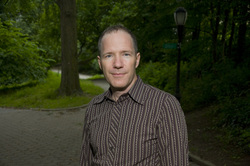 Rick Moody Photo by Thatcher Keats Rick Moody's acclaimed and prizewinning books include the novels Garden State, The Ice Storm, Purple America, The Diviners and The Four Fingers of Death. He has received the PEN/Martha Albrand Award, the Addison Metcalf Award from the American Academy of Arts and Letters, the Paris Review’s Aga Khan Prize, and a Guggenheim Fellowship. He lives in Brooklyn. RUSTY TALK WITH RICK MOODY Kathryn Mockler: What is your first memory of writing creatively? Rick Moody: As opposed to writing non-creatively? I remember attempting to start a novel in 6th grade. Didn't get very far. And there was a poem, in 7th grade, with the same syllabification and rhyme scheme as "Jabberwocky." (Lewis Carroll had just struck a chord with me.) I'm sure there were earlier examples of "creative writing," but I'm not always sure I know what that means. In some ways, all early writing is creative. It's precisely education that teaches us how NOT to write creatively. KM: Why did you become a writer? RM: I got fired from a lot of other jobs. KM: Could you describe your writing process? RM: How I have worked varies from project to project and from decade to decade. Right now, my process is: wait for the semester to end, then write like a maniac, as many hours of the day as are physically possible, bearing in mind the occasional social obligation or need to interact with my daughter. Otherwise: eat and sleep writing and writing-related projects. I don't do it in the same places all the time. I don't do it in the same way from day to day. So there is no science. Be alert to the possibility of language. Follow the language. And revise as much as you can until someone shouts at you that they need the assignment. KM: Rejection or criticism can often stop new writers before they start. Do you have any advice on how to deal with rejection? RM: Always be working on the next thing. KM: What writers would you recommended to an aspiring writer? Or what writers were influential to you when you first started out? RM: Melville Hawthorne Thoreau Joyce Beckett Wolff Faulkner Nabokov Paley Gaddis Barthelme KM: What is the best literary advice you've gotten that you actually use? RM: The only important part is the work. Pay no attention to any part but the work. If you can be content with that part of the job, you will never be disappointed. KM: What are you working on now? RM: A new novel, some stories, a few more essays on music, a poem, and so on. 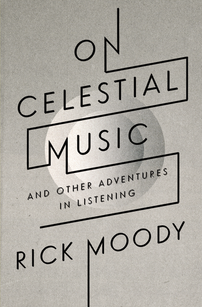 RICK MOODY'S MOST RECENT BOOK On Celestial Music and Other Adventures in Listening, Hachette Book Group, 2012 Description from Hachette Book Group Rick Moody has been writing about music as long as he has been writing, and this book provides an ample selection from that output. His anatomy of the word cool reminds us that, in the postwar 40s, it was infused with the feeling of jazz music but is now merely a synonym for neat. "On Celestial Music," which was included in Best American Essays, 2008, begins with a lament for the loss in recent music of the vulnerability expressed by Otis Redding's masterpiece, "Try a Little Tenderness;" moves on to Moody's infatuation with the ecstatic music of the Velvet Underground; and ends with an appreciation of Arvo Part and Purcell, close as they are to nature, "the music of the spheres." Contemporary groups covered include Magnetic Fields (their love songs), Wilco (the band's and Jeff Tweedy's evolution), Danielson Famile (an evangelical rock band), The Pogues (Shane McGowan's problems with addiction), The Lounge Lizards (John Lurie's brilliance), and Meredith Monk, who once recorded a song inspired by Rick Moody's story "Boys." Always both incisive and personable, these pieces inspire us to dive as deeply into the music that enhances our lives as Moody has done--and introduces us to wonderful sounds we may not know. Read an excerpt of On Celestial Music and Other Adventures in Listening. 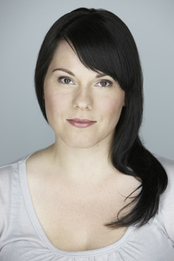 Elizabeth Bachinsky Photo by David Ellingsen Elizabeth Bachinsky is the author of three collections of poetry, CURIO (BookThug, 2005), HOME OF SUDDEN SERVICE (Nightwood Editions, 2006), and GOD OF MISSED CONNECTIONS (Nightwood Editions, 2009). Her work has been nominated for the Pat Lowther Award (2010), the Kobzar Literary Award (2010), The George Ryga Award for Social Awareness in Literature (2010) the Governor General's Award for Poetry (2006), and the Bronwen Wallace Award (2004) and has appeared in literary journals, anthologies, and on film in Canada, the United States, France, Ireland, England, China, and Lebanon. She lives in Vancouver where she is an instructor of creative writing and the Editor of EVENT magazine. RUSTY TALK WITH ELIZABETH BACHINSKY Sara Jane Strickland: What is your first memory of being creative? Elizabeth Bachinsky: I pretended I was a small woodland creature, like a squirrel or a bunny in a burrow, late at night under the covers in my princess bed in Prince George B.C., circa 1980. SJS: How would you describe your writing process? EB: Intermittent. Furious. Private. Hurray! Writing is one of my favorite things to do. No, it is my favorite because, when I’m writing, that means I’m also reading and watching movies and going for walks and talking with friends or making new friends. It also means I have plenty of time to relax and be by myself. Also, I try not to pay too much attention to what I’m writing until I have a big pile of material to shuffle through. So, I guess I kind of try and sneak up on myself so as not to scare myself away. It can be a daunting idea to try and write a book. So, I just write a little whenever I can. Some of what I write happens by hand in notebooks and some it happens on the computers or on my phone. Eventually I get this feeling that something is cooking. Then I type and print everything out and take a look at what’s going on. If nothing comes clear, I just keep writing. But, usually, some fascination of mine comes to the fore and I’m off. I can start to give the thing a shape. All of my books, so far, have happened this way. SJS: What is the revision process like for you? EB: The trick, for me, is to think of revision as sculpting: best to start off with a lot of material and take away and take away until the thing reveals itself. Luckily, writers don’t work in stone. We can put stuff back where it was. Or add new material where it’s needed. That can be fun. And there’s nothing like the feeling of lopping off giant hunks of your book. Best not to get precious. Poems tell me what they need and don’t need, if I pay attention. SJS: Rejection can stop new writers before they start. How did you deal with rejection when you first started out? EB: I try to ignore it. But, when I can’t, I celebrate. Rejection means you’re in the game, baby. You’ve got ambition and you’re not sitting back on your laurels. I celebrate rejection and move on. SJS: What is the best thing about being a writer and the worst thing? EB: For me, the best thing about being a writer is that I get to meet all kinds of people from all over the world and get to travel to places I never thought I would go. Let’s hear it for hospitality suites and hotel shower caps. And some of my poems get to travel even farther than I do. There is my little poem in Beirut! And there it is again in Mainland China! That is super cool. The worst thing? Well… if there was a worst thing, I wouldn’t do it, OK? I have a very low tolerance for agony. Basically, I’m a poet. And there is very little incentive for anyone to write poetry, ever. So, the only reason to do it is because it gives you pleasure or it ignites some curiosity in you somewhere that you simply can’t do without. The moment it becomes laborious or agonizing or whatever, I think I’ll stop writing poetry and do something else. SJS: What are you working on right now? EB: My new book is called The Hottest Summer in Recorded History. It will be out in the Spring of 2013 with Nightwood Editions. 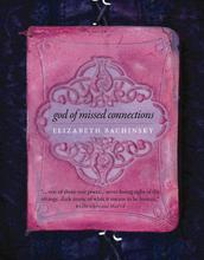 ELIZABETH BACHINSKY'S MOST RECENT POETRY BOOK God of Missed Connections, Nightwood Editions, 2009 Description from Nightwood Editions: Written in the near absence of creative works by Ukrainian Canadians of her generation, God of Missed Connections is a breakthrough collection by one of Canada's leading young poets. This book is profound, devastating, and draws on Ukraine's brave and bloody history as a means to explore the author’s place in the contemporary world. "This book explores a century of cultural assimilation in the West, an experience that is not unique to a Ukrainian-Canadian sensibility. In this book, I wanted to capture the sense of what it feels like to not know where you're from, to be looking for connections, and to come up with ghosts. God of Missed Connections is just the way I've gone about sifting through my own cultural detritus. What makes it through time, what doesn’t? That's what interests me." —Elizabeth Bachinsky 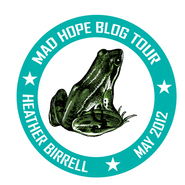 Heather Birrell is the author of the previous short story collection, I know you are but what am I? (Coach House, 2004). Her work has been honoured with the Journey Prize for short fiction and the Edna Staebler Award for creative non-fiction, and has been shortlisted for both National and Western Magazine Awards. Birrell's stories have appeared in many North American journals and antholoiges, including Prism International, The New Quarterly, Descant, Matrix and Toronto Noir. She lives in Toronto with her husband and two daughters where she also teaches high school English. 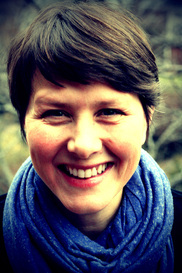 Heather Birrell Photo by Charles Checketts RUSTY TALK WITH HEATHER BIRRELL Kathryn Mockler: What is your first memory of writing creatively? Heather Birrell: I don’t know that I have a first memory of writing creatively although I certainly have some evidence of it. My grade one teacher put together a mimeographed anthology of stories based on Rudyard Kipling’s Just So stories—and I think mine was about why/how the camel got his hump. And I still have the book I was sent as a prize for being a runner-up in an OWL magazine story contest when I was ten. I do remember making up a lot of stories with my sister—I think an inordinate number of them were spin-offs from Annie, The Musical. We were obsessed with that movie and played the soundtrack incessantly. Then I also have diaries full of teen angsty poetry. It’s amazing how many times a person can use the word depressed in one sentence. KM: What keeps you going as a writer or why do you write? HB: I write because the world is a confusing, sad, beautiful place, and there are some amazing, complicated humans living in it. And I guess I feel some pressing need to communicate that to other people. It’s that drive to connect that really keeps me going—especially when my energy is low, or it seems like people don’t appreciate what I’m doing. And I also write because I’ve been doing it for a while now, and I’m getting better at it, but it never stops presenting me with new challenges. It feels like a passion without an expiry date. KM: Could you describe your writing process? HB: I have two small children (3 1/2 and 9 months) so it is pretty much impossible for me to write every day. I also have a full-time day job as a high school teacher (although I am on maternity leave right now), so my time really is at a premium. When I do get time I tend to be fairly focused, mostly because the time is so limited and circumscribed. I prefer to write in the morning—although I find coffee helps create morning-like conditions at other points in the day—and I can only create new work in a notebook, pen to paper. If I have a tricky scene to write, I often use timed writing to force me to confront the problem. I do most of my edits on the computer, then print out drafts and edit some more on the page. I have two pieces of conflicting advice for aspiring writers about the writing time/paying work conundrum: 1. Quit your day job. 2. Don’t quit your day job. I spent many years doing jobs here and there—temping, teaching ESL part-time, freelancing, housesitting—so that I would have time to write, so that I would have the freedom required to dream up stories. But then the stress of not having a steady pay cheque started to impede my creativity and eat up a lot of mental space. I needed a steady job so I could feel safe enough to create. Your life will change and your writing needs will change too—be fearless and be open, but make sure there are enough coins in the coffers to pay for a roof over your head and the occasional visit to the dentist. KM: Rejection or criticism can often stop writers before they start. Do you have any advice on how to deal with rejection? HB: Have people around you who understand that your writing is important to you and that rejection is hard—get them to give you hugs. The writer Judy Fong Bates once told me that a writer can’t afford to be thick-skinned—we have to be able to absorb experience to write about it—so I started trying to cultivate a rejection-resistant rather than a rejection-proof outer layer. If you are offered constructive criticism, take it as a compliment—an editor has taken time and effort because they see something worthwhile in your work. If your work is rejected outright do not see this as a sign to stop writing—see it as a sign to improve your work, to send it out again, to the same places and to different ones. Believe in your project to the point where you want badly to make it better, the best it can be. Celebrate your successes, however small. Take yourself seriously but not too. KM: What writers would you recommended to an aspiring writer? Or what writers were influential to you when you first started out? HB: When I first started writing stories I adored Lorrie Moore; she seemed different to me, less staid, than any other story writers I had ever read—and funny! I also couldn’t get enough of AL Kennedy—I so admired her bravery and sense of humour. It is really exciting to discover writers who challenge me and give permission to try new things or open up in different ways—this doesn’t change. No matter how accomplished, a writer always needs to feel uplifted, spurred on, astonished by fantastic writing! Recently, my inspirations have been Deborah Eisenberg, Amy Bloom, Mary Gaitskill. But I also get jazzed by great essays in periodicals or a wonderful film or song lyric. KM: Your funniest literary moment? HB: Hmm. I did a reading with Darren O’Donnell (playwright, novelist, provocateur, fellow Coach House writer) once. He was up right before me and stripped naked in the course of his reading. How to follow that? It was terrible. And funny, maybe. In retrospect. KM: Can you tell us about your new book Mad Hope? HB: Oh dear. This is my least favourite part of promoting a collection of stories—trying to answer the question What is your book about? It’s so hard for me to have any distance, and then when I do try to describe the stories, I always feel I’m missing something integral. It seems self-serving to tell people to just go read the book (but please do!), so I’ll cobble something here: Though the characters in Mad Hope—their settings and situations—are varied, the stories connect in that they concern people coming through loss with some notion that things will get better, that they will endure. This the 'Mad Hope' of the title. I'd say they're also about family, in their various forms—people struggling to build new families and often failing, people living in atypical families, people whose families are falling apart or are estranged. But again, there are moments of true connection between friends and family members, a measure of catharsis. And there are frogs on the cover! KM: What are you working on now? HB: I have some bits and pieces that might become stories. And a draft of a novel that I would like to make less draft-y. I’m also working on an essay for an upcoming anthology edited by the wonderful Kerry Clare of the excellent book blog Pickle Me This. And I’m working on some kind of workable balance between parenting and writing! 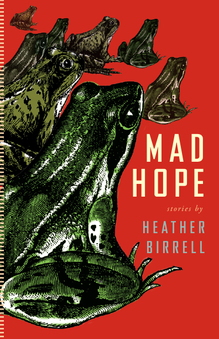 HEATHER BIRRELL'S MOST RECENT BOOK OF SHORT FICTION Mad Hope, Coach House Books, 2012 About Mad Hope In the stories of Mad Hope, Journey Prize winner Heather Birrell finds the heart of her characters and lets them lead us into worlds both recognizable and alarming. A science teacher and former doctor is forced to re-examine the role he played in Ceauşescu’s Romania after a student makes a shocking request; a tragic plane crash becomes the basis for a meditation on motherhood and its discontents; women in an online chat group share (and overshare) their anxieties and personal histories; and a chance encounter in a waiting room tests the ties that bind us. Using precise, inventive language, Birrell creates astute and empathetic portraits of people we thought we knew – and deftly captures the lovely, maddening mess of being human. 'This is a beautiful book: funny, whip-smart, compassionate, and gorgeously written. Heather Birrell belongs in the short story pantheon with Alice Munro, Lisa Moore, and Zsuzsi Gartner.' – Annabel Lyon
|
Rusty Talk
Rusty Talk Editor: Archives
November 2017
Categories
All
|

 RSS Feed
RSS Feed
